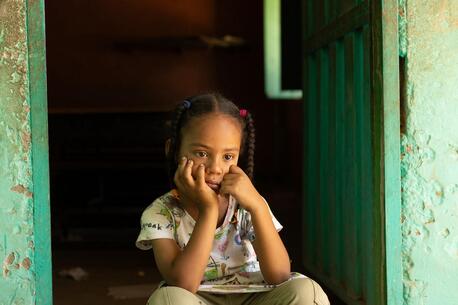
UNICEF Issues Urgent Appeal for Children Suffering in Sudan's Brutal War
Children continue to bear the brunt of Sudan’s civil war as the conflict enters its second year. UNICEF is on the ground inside Sudan working alongside local partners to deliver lifesaving support and protection. But with child malnutrition climbing and famine looming, more donor funding is urgently needed to scale the response.
UNICEF warns an entire generation of children in Sudan face catastrophe as war enters second year
On April 15, 2023, clashes erupted between the Sudanese Army and a rival group known as the Rapid Support Forces (RSF) in Khartoum, the capital of Sudan, and quickly spread to other regions of the country.
One year later, 14 million children in Sudan remain in desperate need of humanitarian assistance. Famine is looking increasingly likely, especially in Darfur, Khartoum and Kordofan, all conflict hotspots. Children are hungry and without health care and other basic services. Safety risks abound: grave violations — killings and maimings, sexual violence, child soldier recruitment — have increased fivefold since 2022.
With over 4 million children forced to flee their homes — in many cases more than once — the country is now host to the largest child displacement crisis in the world. An estimated 1 million displaced children are living as refugees in Chad, Egypt and South Sudan — arriving in already vulnerable, underserved communities struggling with their own emergencies.
And with all schools closed, Sudan also represents one of the worst education crises in the world: more than 90 percent of the country's 19 million school-age children lack access to formal education, threatening a generational crisis.
4 million children in Sudan projected to suffer from acute malnutrition this year
One of the most pressing concerns is the rapidly climbing rate of child malnutrition. UNICEF estimates that close to 4 million children under age 5 are projected to suffer from acute malnutrition this year — 730,000 of whom will die from severe cases unless treated immediately.
Routine immunization coverage has dropped precipitously — in the Darfur region it's down to 30 percent — sharply increasing the risks of measles, malaria and other disease outbreaks. Water infrastructure has been destroyed, magnifying the risks of waterborne diseases; there have already been close to 11,000 reported cases of cholera with acute watery diarrhea, with 300 deaths.
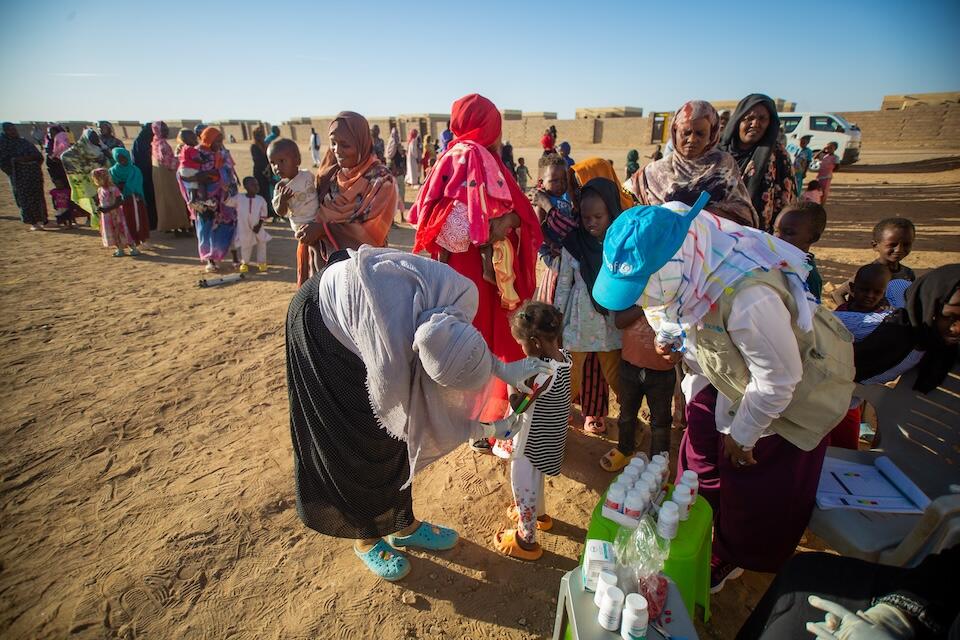
“This brutal war and potential famine is creating an ominous environment for a catastrophic loss of children’s lives,” UNICEF Deputy Executive Director, Ted Chaiban said in a statement released April 14. “Almost half of the children suffering from severe acute malnutrition are in areas that are hard to access, where there is ongoing fighting, making their conditions all the more dire.
"This is all avoidable, and we can save lives if all parties to the conflict allow us to access communities in need and to fulfill our humanitarian mandate — without politicizing aid.”
UNICEF is inside Sudan working alongside local partners to provide children with safety, nutrition, safe water and essential health services, including vaccinations, and to create opportunities for children to play and learn alongside their peers — activities considered essential for their protection and well-being.
But much more needs to be done.
“The scale of needs is so staggering that it’s hard to put into perspective, but let us not forget these are not just numbers,” Chaiban said. “These numbers represent millions of children with names, stories, hopes and dreams. Yet without significant scale up of critical lifesaving services, a reopening of schools and most fundamentally an end to the war, these hopes and dreams will be lost for a generation and for the future of Sudan.”
The impact of UNICEF’s emergency response in Sudan so far
In 2023, working alongside partners, UNICEF reached 6.4 million people with health supplies and 5.9 million people with safe drinking water, and screened 5.4 million children for malnutrition — 313,400 of whom received lifesaving treatment. Over 15 metric tons of vital supplies were distributed across the country.
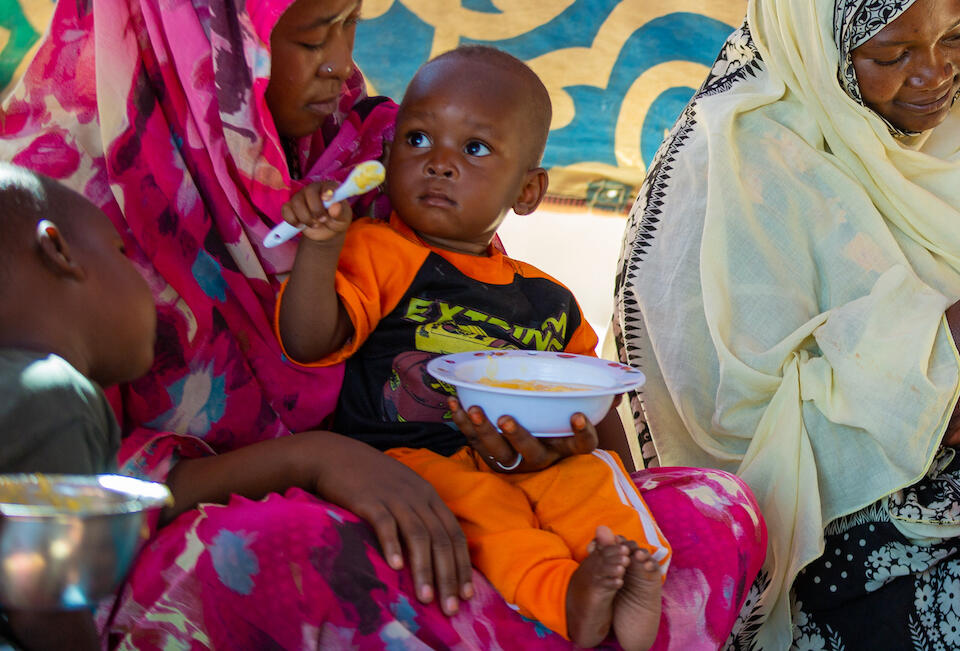
UNICEF has also reached over 870,000 children with psychosocial support to help them heal from the trauma of war, at child-friendly spaces and safe learning spaces set up in areas where families have fled to escape violence. Donor contributions toward testing and scaling these spaces — hubs of support that also offer safe water and health care — have gone a long way toward making kids feel safe, protected and enabling them to continue to learn. There is digital learning available on solar-powered tablets.
And yet more resources are needed to sustain and scale emergency services as famine looms.
UNICEF’s strategy in Sudan: scale lifesaving support as quickly as possible while advocating for peace
UNICEF is committed to staying and delivering for the children of Sudan. Efforts are focused on continuing basic services through existing systems while also working to restore and/or improve those systems wherever possible, so that children can get the nutrition, safe water and sanitation and primary health care they need, including essential vaccines to protect against measles, polio and cholera. In other areas, UNICEF is providing essential health services through mobile clinics.
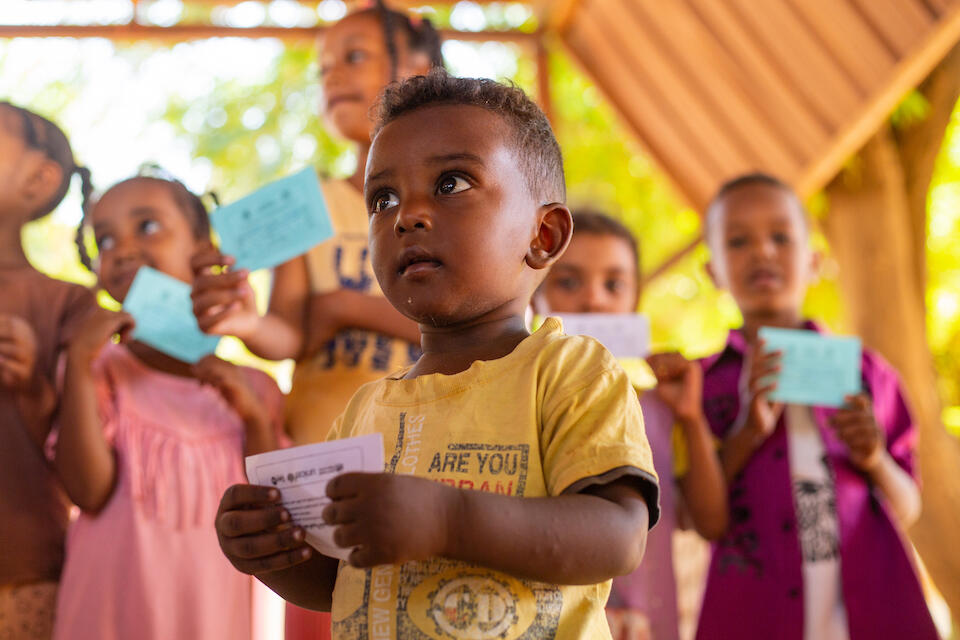
The most vulnerable children are in 135 localities spread across Darfur, Kordofan and Khartoum states. In states where there is active fighting, UNICEF is providing child protection services. In eight states where there is relative calm, UNICEF is reaching displaced children and families with a range of services and support.
UNICEF is appealing for $240 million for the next six months to prevent famine in 93 of the most vulnerable localities, home to 3.5 million children under 5. UNICEF also continues to urge warring parties to stop hostilities and to ensure safe, sustained and unimpeded access for the delivery of humanitarian aid into and throughout Sudan.
“After 365 days of conflict, the children of Sudan remain at the sharp end of a horrific war," Chaiban said. “If immediate steps are not taken to halt the violence, facilitate humanitarian access and provide lifesaving aid to those in need, an even worse catastrophe is likely to impact children for many years to come.”
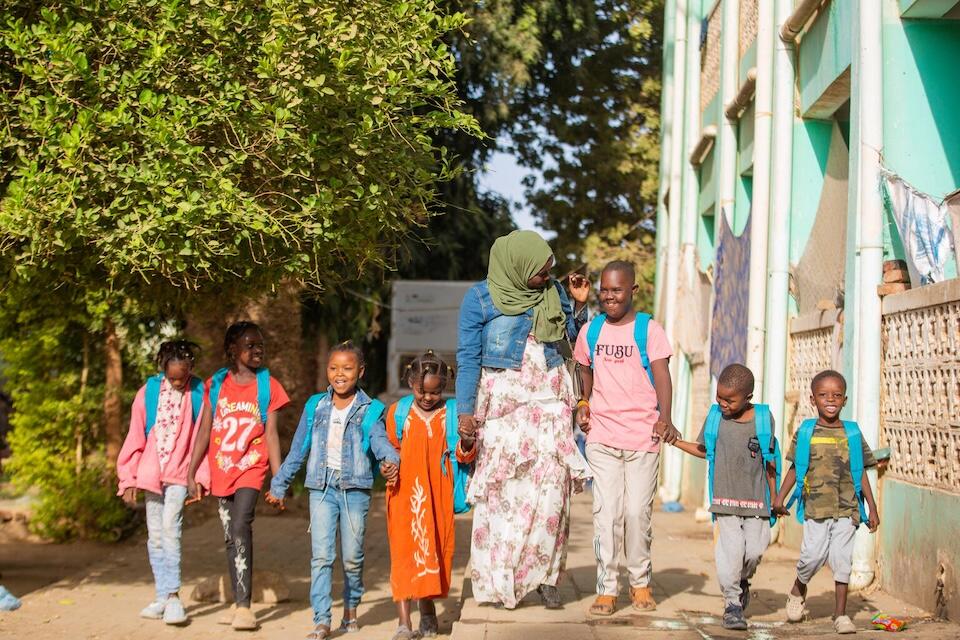
Learn more about how UNICEF assists children in conflict. Support UNICEF. Donate today.


